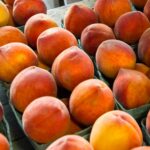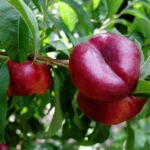Aussie produce industry welcomes China FTA
Chinese tariffs for Australian fruit and vegetable exporters are set to tumble in the coming years after today's historic signing of a free trade agreement (FTA) with the Asian giant, taking the country one step closer to a level playing field with competitors like New Zealand and Chile. 
The Australian Horticultural Exporters Association (AHEA) "cautiously" welcomed the deal, highlighting that while China had been a major focus for the industry, very little had been shipped directly due to high tariffs and difficult quarantine protocols.
The organization mentioned citrus, Tasmanian cherries, mangoes and table grapes as key crops that had access, while protocol discussions were needed for blueberries, avocados and litchis. The AHEA also added that outcomes of the FTA would be the same as for New Zealand and "in many ways" better than Chile.
"New Zealand, Chile and Peru are Australia’s major competitors producing similar products in similar seasons," AHEA executive director Michelle Christoe said in a release.
"These countries are strongly export focused and have existing FTAs with China. Volume exports are important to the growth and viability of the Australian horticulture industry.
"Australia cannot compete and maximise market opportunities without an FTA."
The organization said Australia's proximity, longer shelf life and shorter delivery timeframes, quality and taste offered a strong point of difference. However, despite China almost doubling its fruit volume imports in the last five years, Australia's share of the trade has been "negligible", according to the AHEA.
"Australia supplied 0.2% of Citrus (excluding Hong Kong trade) whilst access for Grapes and Apples is negligible to date," the group said in the release.
"Mangoes, Cherries and Plums are small niche products relative to the market size and Australia at this stage only has access for Mangoes and supplied around 38 MT [metric tons] or 0.3% of the total Mango imports with difficult disinfestation requirements."
Citrus Australia upbeat for fresh and processed fruit
While the Australian Broadcasting Corporation (ABC) reported that all horticultural tariffs would be eliminated in four years, Citrus Australia said China had agreed to cut all citrus tariffs over eight years from the existing 11% rate for oranges and the 12% rate for mandarins.
"Though the time frames are a little long, this is a great outcome for Australian citrus. China is our fastest growing and highest valued export market reaching (AUD)$30 million (US$26.2 million) to September 2014," Citrus Australia CEO Judith Damiani said in a release.
She said Australian citrus exports to China have grown significantly over the past four years, and that trend was now set to continue.
The sector group also mentioned citrus juice tariffs would go from 30% to zero over the next seven years.
"While there is very little export of Australian juice to China this result makes future trade more likely, particularly with the recent success of fresh Australian milk," she said.
"I would like to sincerely thank Trade Minister Andrew Robb and Prime Minister Tony Abbott for their focus and determination to bring this to a positive conclusion.
"We now call for some urgency in the parliamentary process used to approve this historic trade agreement so that citrus tariffs can begin their phase down."
Veggie benefits
Vegetable and potato grower organization Ausveg expressed optimism for the four-year tariff reduction on horticultural products, down from the current average rate of 10-13% on veggies.
"AUSVEG welcomes this agreement, which is expected to boost horticultural industries through significant tariff reductions. The FTA could potentially open up Chinese export markets for the Australian vegetable industry and provide further opportunities for expansion and profitability," spokesperson Andrew MacDonald said.
"This agreement will cement China as a key destination for Australian vegetable exports, and it is hoped that this will benefit regional communities across the country by creating jobs and boosting economies.
"Until now vegetable exports to China have been low and market access has been difficult. Combined with substantial regulatory barriers our growers have had a hard time accessing the Chinese market."
The group added that while decreasing tariffs was an important step, work was still needed in breaking down phytosanitary barriers and other bureaucratic hurdles.
In 2013-14, Australia exported more than AUD$2.5 million (US$2.18 million) worth of vegetable products to China, representing growth of 50% year-on-year.
"We have seen large gains in the number of Australian vegetables making it to Chinese shores since 2007-08 and hope that with today's signing of a Declaration of Intent this pattern continues on its upward trajectory," MacDonald said.
"The increase in the value of vegetable exports from Australia to China is indicative of the rise in demand for high quality and safe vegetables in the Asian region."
Photo: www.shutterstock.com













































